 Petzlover
Petzlover Elo is originated from Germany but Schweizer Niederlaufhund is originated from Switzerland. Elo may grow 17 cm / 7 inches higher than Schweizer Niederlaufhund. Elo may weigh 20 kg / 45 pounds more than Schweizer Niederlaufhund. Both Elo and Schweizer Niederlaufhund has same life span. Elo may have more litter size than Schweizer Niederlaufhund. Elo requires Moderate Maintenance. But Schweizer Niederlaufhund requires Low Maintenance
Elo is originated from Germany but Schweizer Niederlaufhund is originated from Switzerland. Elo may grow 17 cm / 7 inches higher than Schweizer Niederlaufhund. Elo may weigh 20 kg / 45 pounds more than Schweizer Niederlaufhund. Both Elo and Schweizer Niederlaufhund has same life span. Elo may have more litter size than Schweizer Niederlaufhund. Elo requires Moderate Maintenance. But Schweizer Niederlaufhund requires Low Maintenance
 Developed in Germany in 1987, the Elo is a fairly new breed and there are some unique situations surrounding its development. For one thing the Elo Breeding and Research Association has trademarked the breed name, Elo. The use of the name is supervised by the Elo Breeding and Research Association. Secondly, the goal in developing the Elo is the make the best possible pet for a family. The Elo is bred for behaviors rather than appearances, for companionship rather than work.
Developed in Germany in 1987, the Elo is a fairly new breed and there are some unique situations surrounding its development. For one thing the Elo Breeding and Research Association has trademarked the breed name, Elo. The use of the name is supervised by the Elo Breeding and Research Association. Secondly, the goal in developing the Elo is the make the best possible pet for a family. The Elo is bred for behaviors rather than appearances, for companionship rather than work.
The Elo was developed when Marita and Heinz Stories crossed Old English Sheepdogs (Bobtails) with their Eurasiers. They believed that these two breeds were similar in type and development. They were looking to breed a great household pet. The litters from these original crosses were then bred again with Eurasiers or Chow, Dalmatians, and Samoyeds. This expanded the donor base and they continued to breed for character using just the Eurasier, Chow and Bobtail (Old English Sheepdog). Currently there are about 3000 dogs and 60 breeders of Elos. The breed is not really known outside of Germany but that is slowly changing.
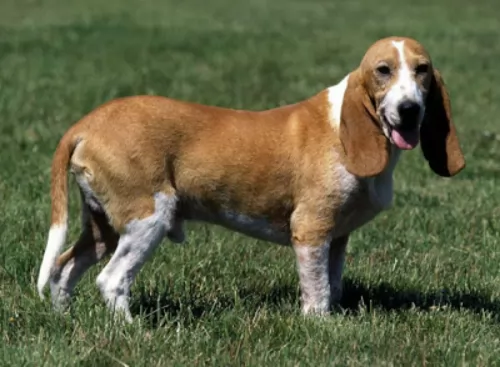 Originating in Switzerland, the Schweizer Niederlaufhund was established around 1900, when hunting became restricted to districts. The Swiss hunter needed a slower dog for the limited territory they could hunt in. Crossing selected Schweizer Laufhunds with Basset Hounds and other selected smaller, short legged hounds developed the Schweizer Niederlaufhund. By 1905 there was already a Schweizer Niederlaufhund Club.
Originating in Switzerland, the Schweizer Niederlaufhund was established around 1900, when hunting became restricted to districts. The Swiss hunter needed a slower dog for the limited territory they could hunt in. Crossing selected Schweizer Laufhunds with Basset Hounds and other selected smaller, short legged hounds developed the Schweizer Niederlaufhund. By 1905 there was already a Schweizer Niederlaufhund Club.
The Niederlaufhund became one of the best hunting dogs in the world, with its powerful body and ability to outhunt the Laufhund in tracking big game. Slower of course than the Laufhund it has a great sense of smell and an ability to easily find wounded animals. There are a few varieties, just like with the Swiss Hound again mostly because of their coloring. The Luzerner Niederlaufhund, the Jura Neiderlaufhund, and the Schwyzerlaufhund. They have musical voices that they use to communicate with the hunters and each other as well as that amazing sense of smell. They can hunt for hours without tiring and without much information from the hunter.
They are a cross breed not recognized by the larger kennel club such as the AKC and the UKC. They are recognized by the Dog Registry of America, Inc. (DRA), the American Canine Association Inc. (ACA) and most importantly by the Federation Cynologique Internationale (FCI). This last one is important because it could lead to recognition as a new breed by the UKC and the AKC.
 As previously mentioned the Elo is bred for behaviors not appearance and not work. Therefore, the appearance of any one dog can vary greatly. There is a breed standard but there is also a lot of diversity in the breed. The Elos’ body is longer than it is tall and it tail is full and furry. He carries his tail over his back in a curve. The Elo has furry, slightly rounded, wide set ears. The undercoat is dense, and the top coat length can be medium or short.
As previously mentioned the Elo is bred for behaviors not appearance and not work. Therefore, the appearance of any one dog can vary greatly. There is a breed standard but there is also a lot of diversity in the breed. The Elos’ body is longer than it is tall and it tail is full and furry. He carries his tail over his back in a curve. The Elo has furry, slightly rounded, wide set ears. The undercoat is dense, and the top coat length can be medium or short.
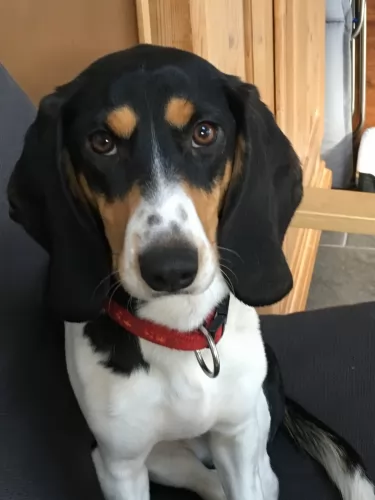 The Schweizer Niederlaufhund is a medium size, short dog. They look like their cousins, the Schweizer Laufhund but smaller. Their body is just slightly longer than it is tall, so you are left with the impression of a mostly square dog. The Niederlaufhund is well put together, with strong legs, a noble head, long droopy ears, broad chest, and a low held tail.
The Schweizer Niederlaufhund is a medium size, short dog. They look like their cousins, the Schweizer Laufhund but smaller. Their body is just slightly longer than it is tall, so you are left with the impression of a mostly square dog. The Niederlaufhund is well put together, with strong legs, a noble head, long droopy ears, broad chest, and a low held tail.
The Small Lucerne Hound has a white cote with smooth speckles of black or gray making them appear to be blue.
The Small Bernese Hound has a tricolor coat of white, tan and black. There are tan marks on the eyebrows. There is a wire haired Small Bernese as well. He has a short beard.
The Small Schwyz Hound is smooth coated in white with orange or yellow-red patches. The wired haired version is extinct.
The Small Jura Hound is a single coated dog with a black coat and tan marking above his eyes as eyebrows as well. He might have some white as well.
 Having been bred to be a companion animal, the Elo loves children, is loyal, playful, obedient and calm. They love to and need to be with their people. These are not independent, think on their own dogs. They depend on their people in order to be happy and well behaved. He is outgoing and friendly with people.
Having been bred to be a companion animal, the Elo loves children, is loyal, playful, obedient and calm. They love to and need to be with their people. These are not independent, think on their own dogs. They depend on their people in order to be happy and well behaved. He is outgoing and friendly with people.
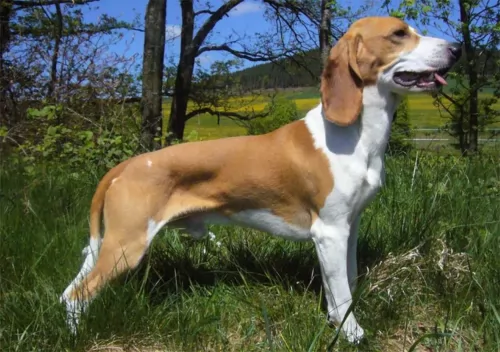 Children friendliness – yes, they are but use caution around small children and small prey.
Children friendliness – yes, they are but use caution around small children and small prey.
3. Adaptability - needs room to run and explore – is very frustrated when confined.
 At this point in time the Elo breed is very young and has a very small population, so the breeding group is small and probably inbred. This can lead to hereditary diseases and the Elo is not immune. However, they are a healthy breed and it seems the major issue is Disticha – an eye disease that causes corneal damage. It causes corneal ulcers, inflammation, scarring and tearing. There are a variety of treatments including surgery
At this point in time the Elo breed is very young and has a very small population, so the breeding group is small and probably inbred. This can lead to hereditary diseases and the Elo is not immune. However, they are a healthy breed and it seems the major issue is Disticha – an eye disease that causes corneal damage. It causes corneal ulcers, inflammation, scarring and tearing. There are a variety of treatments including surgery
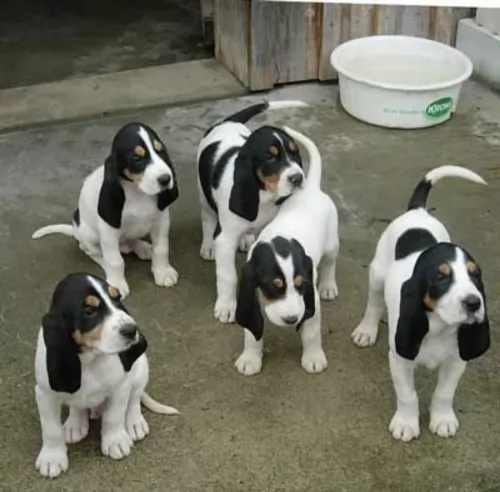 The Niederlaufhund Is prone to a very medical issues to keep an eye on. They include:
The Niederlaufhund Is prone to a very medical issues to keep an eye on. They include:
• Hip Dysplasia – This comes from hip joints that are not well formed and cause reduced mobility and pain. Parents can be tested before the dogs are bred to make sure their hips are good, and that dysplasia will not be passed to puppies. This dysplasia can cause arthritis and even lameness.
• Ear Infections – With long drooping ears it is easy for the dog to acquire ear infections. This is even more so for a hunting dog like the Niederlafhund. It is important to clean the dog’s ears on a regular basis.
 The Elo is a non-working family dog so do not over feed them. Use a high quality dry food made for a medium size dog.
The Elo is a non-working family dog so do not over feed them. Use a high quality dry food made for a medium size dog.
As mentioned previously the Elo breed is so young as a breed that there have been very few health studies and the only inherited issue at this time besides the Disticha.
Even though the Elo is a non-working dog, they do require a substantial amount of exercise daily. They need outdoors space to run and play as they are very playful with their family. He loves to go on walks, to run, play and dig. Yes, he can be a digger if he is not provided with appropriate and alternative exercise. Without exercise the Elo can be irritable and display behavior issues.
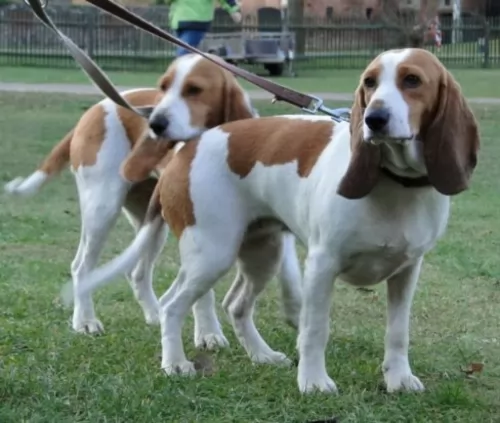 1Feeding the puppy - give 1 cup per day of high quality dog food divided into 3 meals.
1Feeding the puppy - give 1 cup per day of high quality dog food divided into 3 meals.
2.Feeding the adult – give one and one half cups of high quality dog food divided into 2 meals.
4. Games and Exercises – needs a lot of daily exercise and loves field trials, running and activities like barn hunt.